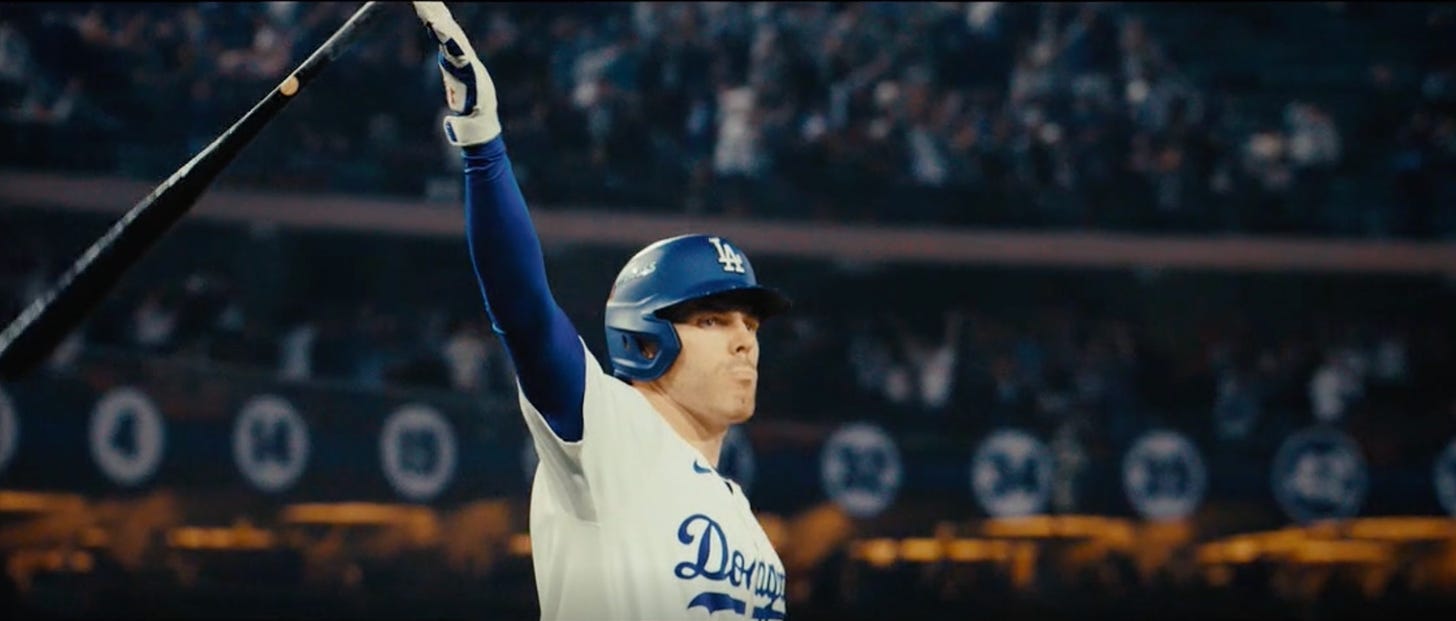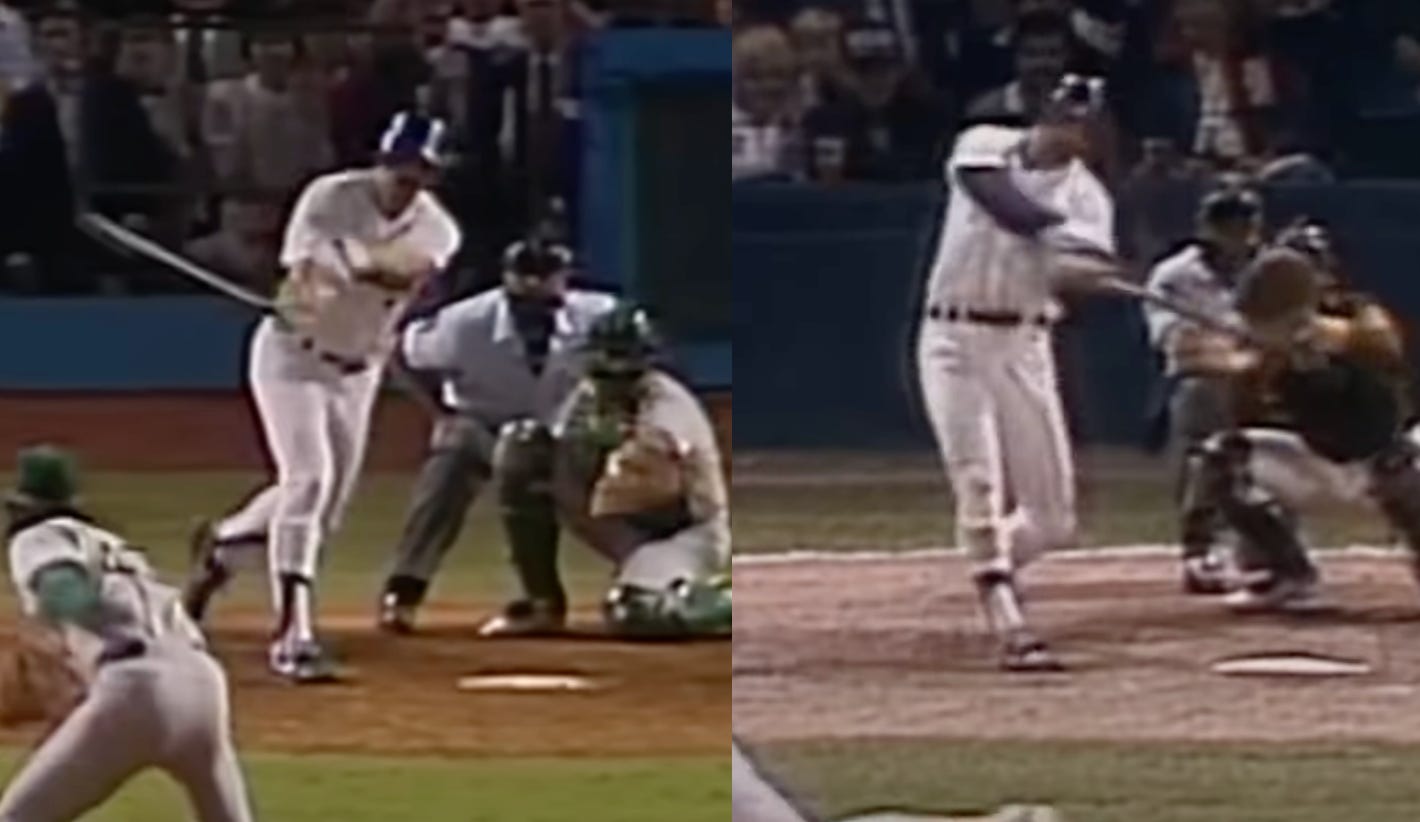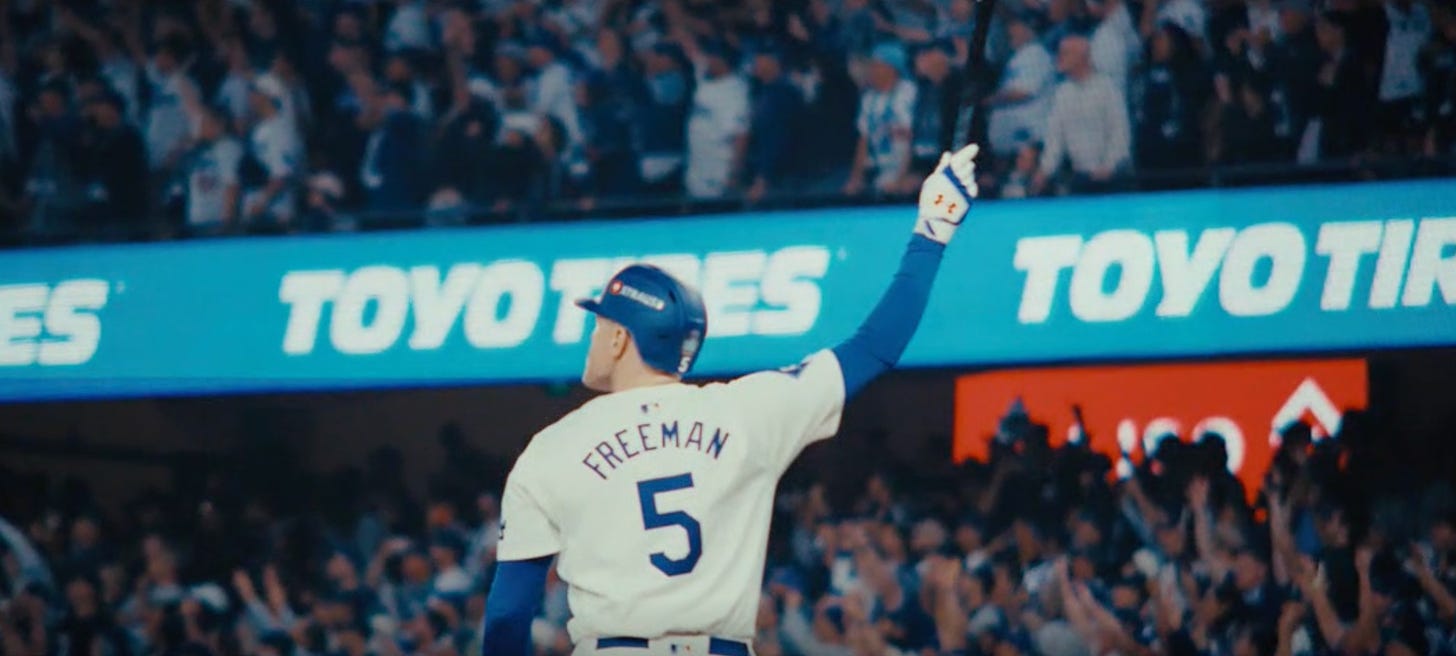Freddie Freeman's Was Something Different
Over five games, the meaning of the statue pose changed.
Before Game 2 of the World Series, Fox showed a pre-game montage with a solemn voiceover: “Moments that define a generation. You never know when they’re coming. You can’t describe it once it happens but you feel it forever.” The video images, in order:
Bill Mazeroski’s walk-off homer,
Carlton Fisk’s stay-fair homer,
Kirk Gibson’s limp-around-the-bases homer,
Reggie Jackson’s Mr. October game,
Willie Mays’ The Catch,
Derek Jeter’s Mr. November homer,
Joe Carter’s walk-off homer,
Kirby Puckett’s See You Tomorrow Night homer,
Don Larsen and Yogi Berra hugging out Larsen’s perfect game,
Reggie again,
Fisk again,
Carter again,
Gibson again for a long time
Maybe, like me, you mentally rearrange these by date:
1954
1956
1960
1975
1977
1988
1991
1993
2001
Obviously, a Fox montage doesn’t define canon, but the suggestion is that we were more than a generation removed from the last “moment that defines a generation.” It does make some sense that, the longer baseball gets played, the less frequently new clips will get added to the Great Big Montage. As more games have been played, fewer achievements will be unprecedented; more things will be, simply, callbacks to earlier things. Indeed, the greatest moments of the recent era are often explicitly framed as callbacks. David Freese’ homer in the 2011 World Series might well have been the next highlight Fox would have added to that montage, and in some ways that home run is most famous as a callback: Joe Buck echoing his dad’s Puckett call on the broadcast, “we will see you… tomorrow night!”
It was via that callback frame that we first processed the Freddie Freeman home run in Game 1 of this World Series, with Joe Davis perfectly mirroring Vin Scully’s call of the Gibson homer, then tacking on “Gibby, meet Freddie!”
**
There were superficial similarities that, for storytelling purposes, made the comparison delicious. Both were hit for the Dodgers, into the same part of the ballpark, at 8:37 p.m.
But Gibson’s home run is the most famous in baseball history not because of the team he hit it for, or the part of the stadium he hit it to, and certainly not for the time on the clock. Gibson’s homer became the ultimate MLB highlight for three reasons:
The stakes of it—it is the highest Win Probability Added event in World Series history.
The challenge of the matchup—the Dodgers were huge underdogs in the series and Gibson was an underdog in the at-bat, against the game’s best closer and the year’s Cy Young runner-up.
And, by far most importantly,
Gibson’s physical compromise. He was injured, a bad hamstring on one side and a bad knee on the other. It wasn’t entirely clear that, if he hit a ball to the outfield, he’d be able to make it to first base before the outfielder threw him out.
Freeman’s homer doesn’t quite reach the same level on the first two measures, but close enough. But the frailty comparison—Freeman playing on an ankle that he injured at the end of the regular season, and rushed back from—was hard to judge. Gibson was so hurt in 1988 that he wasn’t even introduced on the field before the game, and so hurt he didn’t appear again in the Series. He was so hurt that he almost fell over on his first swing of the at-bat, and even taking a pitch he tumbled out of the batter’s box and almost interfered with a stolen base. He couldn’t push off one leg and he couldn’t land on the other; he was all arms and barely that. He spent the extended at-bat limping around—“shaking his leg, making it quiver, like a horse trying to get rid of a troublesome fly,” as Scully1 put it on the broadcast. Consider Gibson’s home run swing in 1988 (left) against his home run swing in the 1984 World Series (right):
The man on the left had nothing, barely an athlete.
It might seem pedantic, or even uncharitable, to say that Freeman wasn’t limping as badly as Gibson. But what I mean isn’t that Freeman’s home run was in any way lesser, but rather, that it was heroic—in the narrative sense—in a completely different way. Gibson’s home run was that of a protagonist dying, and managing in his final gasp to do one last brave thing to save the world. Freeman’s home run was that of a protagonist who, having traveled a long and harrowing journey, has finally arrived at the final battle. To save the world.
**
Freeman was badly compromised in the first two rounds of the playoffs, and had to sit out the final game of the NLCS. When he spoke to reporters during his week of rest, he seemed optimistic, but also uncertain. He was getting a long break from running, and he was still able to work on his swing in the meantime. He stated without a doubt that he was going to start the first game of the World Series, but he couldn’t say any better than we could whether his ankle would be healed, workable, or an enormous liability.
But by the first inning of the World Series there were signs he had improved a lot. He tripled in his first at-bat, with two notable aspects: He got to third base about as fast—just a tenth of a second slower—as he had on an almost identically placed triple earlier in the season; and it was a fairly unnecessary triple. There were two outs, which meant getting to third (on a close play) wasn’t a big priority. Freeman’s decision to take this extra base, then, told us a lot about his comfort.
A play that came later in the series would be even more convincing. In Game 4, with runners on, he grounded into a possible double play. He beat the throw to first base by inches (with a heaving lunge, landing on the base with his previously injured ankle). It was, according to Statcast, his fastest home-to-first time all season. Gonna repeat that: It was, according to Statcast, his fastest home-to-first time all season. A run scored on the play.
And, of course, in between those two plays he hit four home runs. We’ll never know to what degree Freeman’s hitting might have been compromised physically this week—and I’ll spare you my speculative/inconclusive analysis of his right foot angles on a bunch of his postseason swings—but a reasonable conclusion from his performance would be “probably not much!”
The key detail in all of this storytelling is that Freeman played through the pain in the NLDS and the NLCS. That was the real hero’s journey here: He defied all expectations by playing in games just a week after a severe ankle sprain. He spent hours treating it every day, and at times played through increasing levels of pain. He even—and this is no small thing—kept playing despite it making him struggle. He hit a mere .219/.242/.219 in the first two series.
Playing through those two series is probably what made his World Series performance possible. Batters really do get rusty when they sit out for a while. There’s good evidence that rust makes hitters worse. If Freeman had rested his ankle during those two series, so that he could come back healthy in the World Series, the Dodgers might well (probably would have?) reached the World Series anyway and welcomed him to the lineup fully healed. But in that scenario, he’s probably not an impact hitter right away.
**
And was he ever an impact hitter! There are a handful of players who have hit “better” in a World Series than he did, if you are looking at their OPS or their home run totals or what have you. But I could make an argument that Freeman’s was as consequential as any great World Series performance you could name, because a) he was really great and b) his teammates desperately needed him to be.
The rest of the Dodgers hitters were baaaaaaaaaad. Take out Freeman’s batting stats and the Dodgers hit .193/.287/.321 in these five games. That’s Niko Kavadas’ slash line this year. Who? Right.
Freeman hit more than half of the Dodgers’ homers. He very nearly drove in half of their runs (and tied the all-time World Series RBI record, in just five games). His Win Probability Added was 80 percent of the lineup’s WPA. In five games, he led the Dodgers in WPA three times, and was third and fourth in the others.
That’s the left-brain stuff. The right-brain case for him is even better, because this World Series felt more like a momentum series than any I can remember. Freeman produced the first momentum push with his Game 1 walkoff, and then kept the Yankees stifled—playing from behind—with early home runs in games 2 and 3. Then the Yankees took momentum with Anthony Volpe’s grand slam in Game 4, and seemed unstoppably on the march to Los Angeles in Game 5, before abruptly opening the door with three fifth-inning misplays. But the Dodgers still needed an actual hit to take momentum fully back. Freeman had that hit, too. Always Freeman in this series.
**
“Moments that define a generation. You can’t describe it once it happens…”
We tried to describe it in the moment, putting it in the Kirk Gibson genre of big swings. But as time went on, I think that became the wrong comp. There really actually isn’t a comp to what Freeman did in this series—it’s unprecedented, at least in the World Series. The best comp might be Reggie Jackson’s 1977—a great player whose October greatness hadn’t actually shown up yet, until it suddenly did—but even that doesn’t work. Jackson was confidence waiting to be fulfilled; Freeman was uncertainty waiting to be tested.
“It’s going to be a 100 percent go for me on Game 1, and we’ll adjust off of that,” he told reporters before the series. When he homered in Game 1, and he held the bat up, it wasn’t exclusively about what he’d done. In retrospect, it was a triumphant statement of what we now realized he could do, and a prophetic statement of what was to come. They should probably should build a statue. They should absolutely put it in the montage.
Originally this post credited the horse-quiver line to Joe Garagiola, which—given the choice between Scully or Garagiola, you really have to wonder how I biffed it. It’s been fixed.







I'm an old codger Yankee fan but even I have to acknowledge how great Freeman was in the World Series. The younger version of me would have been very angry at his performance against my team; the more mellow version simply has to tip my cap. A performance for the ages. Thanks for the great analysis.
Great article. In addition to the Freese homer, I would throw in the Howie Kendrick homer in 2019 and Madison Bumgarner's game 7 relief appearance in 2014 as similarly pantheon-worthy moments from this "generation" of World Series (i.e. the last 22 years).